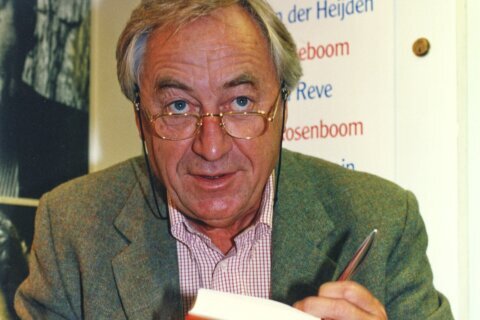WASHINGTON — When the Oscar contenders face off Sunday, Laura Poitras’ Edward Snowden doc “Citizenfour” (among my Top 10 Films of the Year) will be operating with a huge power play. That’s because two great documentaries — both by Chicago-based filmmakers — will be stuck in the penalty box when they should be out on the Academy Award ice giving their rivals a shootout.
We’re talking about the Roger Ebert profile “Life Itself” (2014), directed by “Hoop Dreams” creator Steve James, and the less publicized “Red Army,” directed by Gabe Polsky. WTOP spoke with James about “Life Itself” last summer. Now, we chat with Polsky about his hockey doc, which premiered at the Cannes Film Festival before winning Audience Awards at the AFI Fest and Chicago International Film Festival and a nomination for Best Doc Screenplay at the Writers Guild of America Awards.
The movie follows the Soviet hockey team, who dominated the sport internationally throughout the 1970s and 1980s, but is remembered for losing to the U.S. Olympic team in 1980.
“We know so well the Miracle on Ice. On the one hand, it’s one of the great American sports stories of all time, but on the other hand, it’s a tragedy,” Polsky tells WTOP. “The legacy of Soviet hockey was a miracle itself — not just the dominance, but the artistic achievement that was demonstrated on the ice. The way they played was a revolution in creativity in sport, and that was forgotten in North America. And I found that to be somewhat tragic. … I wondered how in such a brutally oppressive system that such free and open improvisational hockey could exist.”
Thus, the hockey team becomes a microcosm of the collapse of the Soviet Union, chronicling the players who, one by one, use Russia’s perestroika reforms to jump to the capitalist culture of the NHL, including Washington Capitals star Alexander Ovechkin.
“I did some research and found that the experience of this team really paralleled the rise and fall of the Soviet Union,” Polsky says. “What these players went through is similar to what the country was going through at the time.”
Polsky grew up in Chicago and first saw the Soviet team play on a VHS tape at age 15.
“I was mesmerized,” Polsky says. “For me, it was almost a religious experience.”
He went on to play Division I hockey at Yale University before becoming a filmmaker.
“As soon as I realized I wasn’t going to play in the NHL, I was thinking about what I was good at,” Polsky says. “I was a political science major, but I didn’t want to be a politician or go to law school or something like that. My roommate was writing and doing sketch comedy and shooting videos, and I thought that was interesting and, for some reason, something clicked.”
The new career path of filmmaking led to the nonfictional “His Way” (2011), which earned a Primetime Emmy nomination for nonfiction special, and the fictional “The Motel Life” (2012), which earned Audience Awards at both the Rome Film Fest and the Chicago International Film Fest.
Now, the universe has brought Polsky back to hockey.
“I never felt that I contributed the way I felt I could to hockey, to the sport,” he says. “For some reason, God sort of brought me back to it.”
His approach to “Red Army” was to focus on the human elements of this well-oiled hockey machine.
At first, the legendary coach Viktor Tikhonov declined to participate.
“I was certainly very frustrated initially and was bummed because I thought I could maybe get something great,” Polsky says. “But I think it’s for a reason. There’s silver linings somehow. … You have to just keep moving. Sometimes there’s a blessing in disguise.”
Eventually, he found his angle, when team captain Vyacheslav Fetisov finally agreed to an interview.
“I couldn’t reach him. Finally when I reached him, he was stonewalling me,” Polsky says. “Ultimately, one day he called back. It was actually the last day of the shoot in Russia, and he said he would give me 15 minutes. … My goal was just to keep moving it, and getting deeper and deeper, and ultimately that first interview lasted five and a half hours, and was the first of three interviews. He said he’s never opened up like this to anybody.”
Through the eyes of Fetisov, “Red Army” becomes a deeply personal tale.
“It’s a story about a guy that believes in the system, is patriotic and plays for the Soviet Union, represents them, is captain of the team … and then ultimately becomes disillusioned against the system that created him and has to fight against it,” Polsky says.
Despite the Oscar snub, Polsky has enjoyed a wild ride on the festival circuit.
“Cannes was amazing,” Polsky says. “Then I was in Toronto and Wayne Gretzky and his family [were] in the audience … Afterward, he said he loved the movie; his wife was raving about it.”
He admits he was nervous to bring the movie to the Moscow International Film Festival.
“That was the most worried I was. … I thought, ‘If this doesn’t work here, I’m a failure,'” Polsky says. “But they gave me a standing ovation for 15 minutes and people were crying. They had an intense emotional relationship to the film, because of their past, and they get it; they feel it; they lived it. It was something that was very personal to them.”
He said the Moscow audience was both impressed and puzzled by the universality of this story.
“They felt that it was a little bit strange that an American guy could tell this emotional story about their history in that way,” Polsky tells WTOP. “It’s like if some Russian were going to come to the U.S. and say, ‘I’m gonna make a movie about the Miracle on Ice from the American perspective.'”
Now, after it’s toured the world, you can finally see “Red Army” in the D.C. area. The film is playing at the E Street Cinema in Northwest D.C. and at the AMC Loews Shirlington 7 in Shirlington, Virginia.
If you’re a Caps fan, hockey nut or simply love Cold War history, you owe yourself to check it out. Like a 60-minute hockey game, the 76-minute film is a quick watch, but every minute is riveting.
★ ★ ★ 1/2
The above rating is based on a 4-star scale. See where this film ranks in our Fraley Film Guide. Follow WTOP Film Critic Jason Fraley on Twitter @JFrayWTOP and hear his movie reviews Friday mornings on 103.5 FM.








